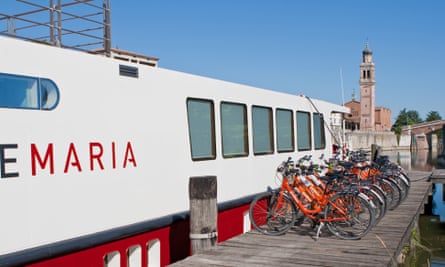
Ten years ago, while exploring the Renaissance city of Mantua in Lombardy, I bumped into a bunch of cyclists embarking on a “bike and barge” trip all the way to Venice. It sounded like the perfect way to hit the quiet backroads of the little-known Polesine region, which surrounds the Po River and stretches to the Adriatic. Finally, here I am, joining the trip (though in the opposite direction), boarding the Ave Maria, which is moored behind Palladio’s iconic Redentore church on the island of Giudecca. The once rust-encrusted 42-metre transport boat was saved from the scrapheap by local tour operator Girolibero and transformed into a very comfortable 17-cabin floating hotel.
My 32 fellow passengers are a cosmopolitan crowd: Britons, Berliners, Americans, Canadians and New Zealanders, ranging from a teenage student to sprightly retirees. Unlike me they are experienced cyclists, but the tour leader, Hein Hoefnagels, a superfit 74-year-old Dutchman, reassures me that “this is a holiday not a road race”. We will be travelling at a leisurely pace, covering between 15 and 35 miles a day for eight days with lots of stop-offs (including the fishing port of Chioggia and the ancient town of Adria); the roads are flat – plus there’s the option of an electric bike instead of a touring one.
The boat sets off at 8am from Giudecca while we tuck into breakfast, slowly chugging across the lagoon to the northern tip of the lido, home to grand art deco villas and long sandy beaches. The keen bikers are kitted out in fluorescent spandex, some with their own cycling shoes and personal pedals; others, like myself, are in T-shirt and shorts.
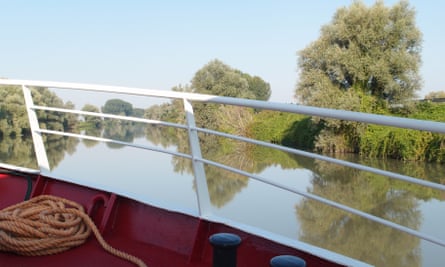
With more than 30 cyclists heading off along the lido’s narrow promenade, at first I feel there is a Tour de France multi-crash waiting to happen. But the two guides, upfront and at the rear, make sure safety is the priority. The ride runs along the spectacular Murazzi sea wall, on to a ferry that crosses to the fisherman’s island of Pellestrina, and ends by the wild dunes of the Ca’Roman nature reserve. Keen birdwatchers head off on a hike with the junior guide, Irene Badone, an enthusiastic ornithologist, while stragglers like me climb back on to the Ave Maria where high tea awaits. It is one of the trip’s many genuine sustainable initiatives; delicate salami and salad tramezzini sandwiches, cookies and fruit smoothies – all recycled from breakfast leftovers.
Dinner is a delicious meal of thick bigoli spaghetti smothered with mackerel and wild fennel sauce, followed by sea bream roasted in a crunchy crust of potatoes and almonds. To complete a perfect day, the sun dramatically sets over the water. Most of us head to bed early (the comfortable cabins are a mix of doubles and a few bunks, all with en suites, and most have beautiful views over the water from portholes).
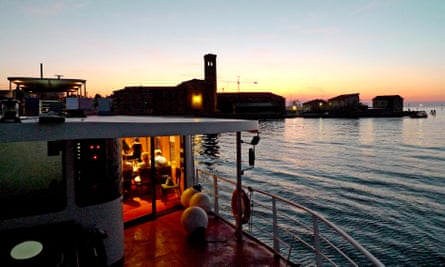
Each evening after dinner, Hein talks us through what is in store the next day, highlighting historical, social and environmental issues as well as classic sightseeing. For Venice, he perfectly explains the problem of acqua alta floods and just how the Mose dam is helping. While approaching the Po delta, he talks about how climate change has affected the area, from deadly floods in 1951 to the present freshwater drought, which allows a “saline tongue” from the sea into the freshwater wetlands, meaning local farmers can no longer irrigate their crops with the increasingly saline water, and changing biodiversity threatens the traditional breeding grounds of clams and mussels.
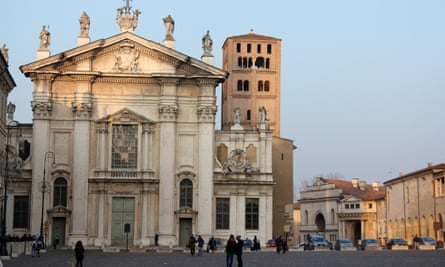
The Ave Maria’s captain, Riccardo Tamani, is a mine of information too. A “paesano del Po”, born here and working all his life on the river and its canals, he has seen lots of changes in his time. Today, he says, it is impossible to navigate on the Po because water levels have dropped dramatically, so he sticks to a network of canals, with cyclists following waterside towpaths alongside stretches of the Po, Adige and Brenta rivers. “Much of the fragile environment is under threat from annual droughts caused by global warming,” says Riccardo, “but I am grateful that I can still earn my living bringing tourists here to discover the unique wetlands of my homeland.”
after newsletter promotion
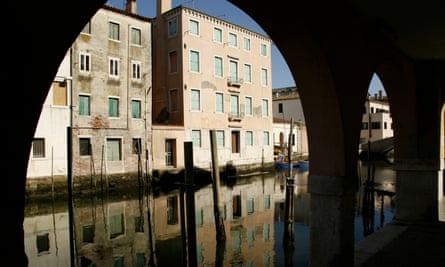
Each day brings a different set of surprises. After Venice, urban stops include Chioggia (for its canals and fish market), Ferrara (for stunning Unesco world heritage architecture), and Mantua (for beautiful lakes and palaces). But for most of us, the highlights are the more unexpected sights; riding a narrow path surrounded by the still waters of the Po delta nature reserve, passing a flock of pink flamingoes and ancient “casone” cottages of wetlands fishers. Everyone loves the visit to a dairy making grana padano cheese, a local version of parmesan, and no one is prepared for the brilliant Museo della Giostra in the sleepy hamlet of Bergantino. As unlikely as it seems, for more than a century this has been where many of the fair rides for amusement parks across the globe have been made and the museum is utterly enchanting.
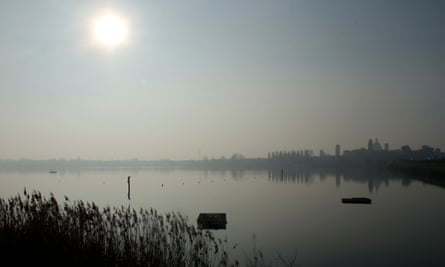
The organisers certainly do everything to live up to their Girolibero name, giving the option of riding with the group and tour leader or downloading their free app to cycle independently. Want a rest day? Then stay on the boat as it navigates canals and locks. During the city stops, guests can join the guided tour or head off and explore alone; they can eat at a roadside trattoria or make a free packed lunch from the buffet breakfast. It’s the perfect balance of comfort and independence – ideal for less adventurous cyclists who like a comfortable bed and great food.
Girolibero runs a similar bike and barge trip in France, through the Camargue to Avignon, and when the time comes to pack luggage and disembark, many of the group are already considering that for next year’s holiday.
The trip was provided by Girolibero. The eight-day/seven-night tour (Venice to Mantua or vice versa) begins at €1,030pp (in a twin cabin) including breakfast, dinner, packed lunch, visits and walking tours. Rent a Girolibero touring bike for €100, or an e-bike for €250.



